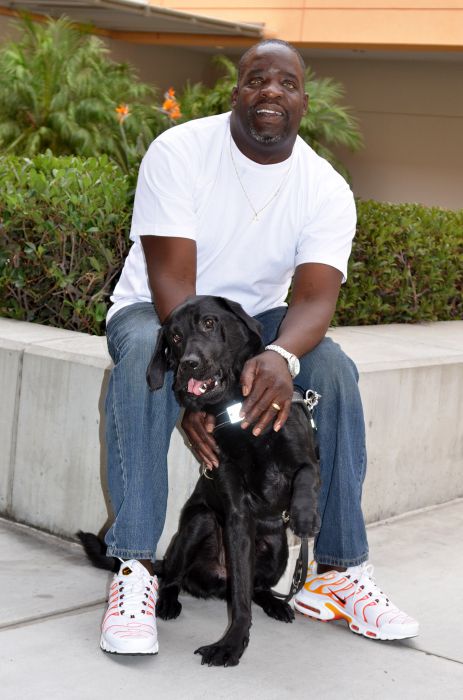“Are we going? Are we going? Are we going?”
That’s what California State University, Dominguez Hills (CSUDH) graduate student Andre Green believes his new 2-year-old guide dog Heath is expressing each time they get ready to leave their home in Los Angeles to travel to campus, or to go on an errand.
Heath’s personality and temperament are just what Green, a 50-year-old who is working on his master’s degree in sociology, looks for in a service dog.

“Heath, who I just got in July, is already adjusted to my style. At home he follows me wherever I go,” said Green, who lost his vision 26 years ago. “It’s not until I take my shoes off that he’ll go over and lay down. He then knows I’m not going anywhere, so he can relax.”
Green went more than a year and a half without a service dog after his previous dog, Teagan, was retired in November 2013. With a busy school and work schedule, Green initially couldn’t find the two weeks needed to attend the Guide Dogs of American (GDA) courses necessary to train with a new dog. And then there was the matter of finding the right fit.
“I didn’t get to the training classes until January of this year. I was at the school for nine days to be trained with another dog–not Heath. But that didn’t work out. It just wasn’t a match and we didn’t bond, so I ended that training. I wasn’t able to get back to the school until this July, and that’s when I got Heath,” said Green. “I need a happy dog. I need a go-getter, a fast runner and dog that is ready to work, like Heath.”
With the keen vision and intelligence that are traits of Labrador Retrievers, Heath makes things a lot easier for Green while navigating the sprawling CSUDH campus.
“There was many times I got lost rushing to my ride at night, and even when I am not in a rush I tend to go the wrong way if I am not sure where I am. I can surely get lost because one wrong turn can get you confused,” said Green, who also earned his bachelor’s degree in sociology at CSUDH.
“The best thing Heath does for me is get me to every department, which is good because I need to get to them in a timely manner,” he added. “Once I show him and tell him what the name of the building is, he remembers. So I don’t have to wonder where I am at all with him. I just tell him where I need to go. He gets me there faster, and safer.”
Green typically doesn’t have any problems with other students when walking around campus with Heath. In fact, students often ask him about his dog before they inquire about him.
However, Green does have to put his foot down when it comes to others petting his guide dog. He sometimes would place a “Please don’t pet the dog” sign on his previous dogs.
“When you see a harness on a dog, you shouldn’t just walk up to the dog and start petting him,” said Green “Then, the next time he sees that person, he thinks ‘I know you,’ then goes over there as opposed to doing his job. I may not know he took that detour because I think he’s doing the demand I gave him.”
In addition to his coursework, Green is also employed on campus as a peer mentor in Disabled Student Services (DSS), assisting others students with disabilities navigate college life. He does everything from suggesting the best courses for them to take so they may graduate faster, to just being that person who’s been where they are and can offer a friendly ear.
“I’m a student as well, which helps me out a lot when working with my fellow students. Knowing what classes to take and those that are not necessary is very important for them,” said Green, who has been working for DSS for three years. “I talk to them one student to another, and sometimes even give them personal advice if they ask.”
Green would like to work as rehabilitation counselor in vocational rehabilitation after college or stay with DSS, if the opportunity presents itself. But for now, he looks forward to continuing to work with his fellow students and attending classes, which is a restful time for Heath.
“In class Heath just lies down and goes to sleep. He even snores, then the class starts laughing,” he said. “However, it does not distract the professor from teaching.”